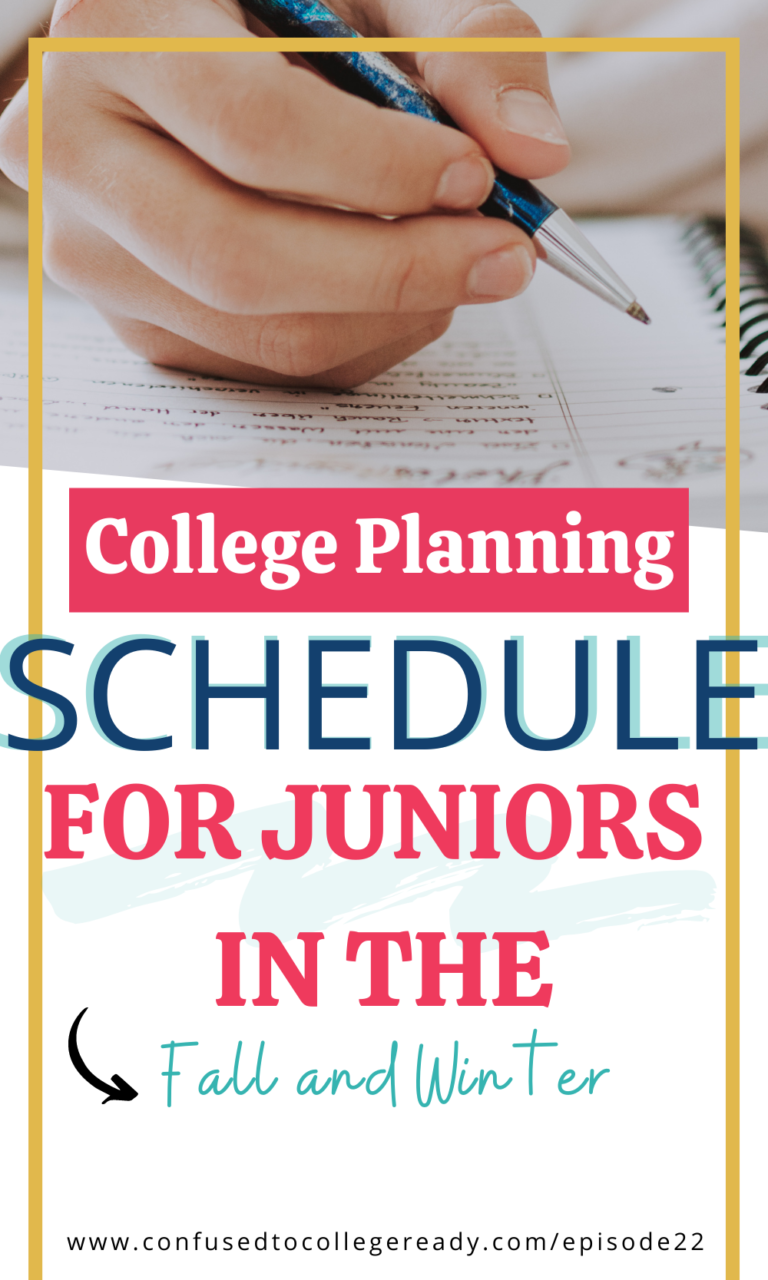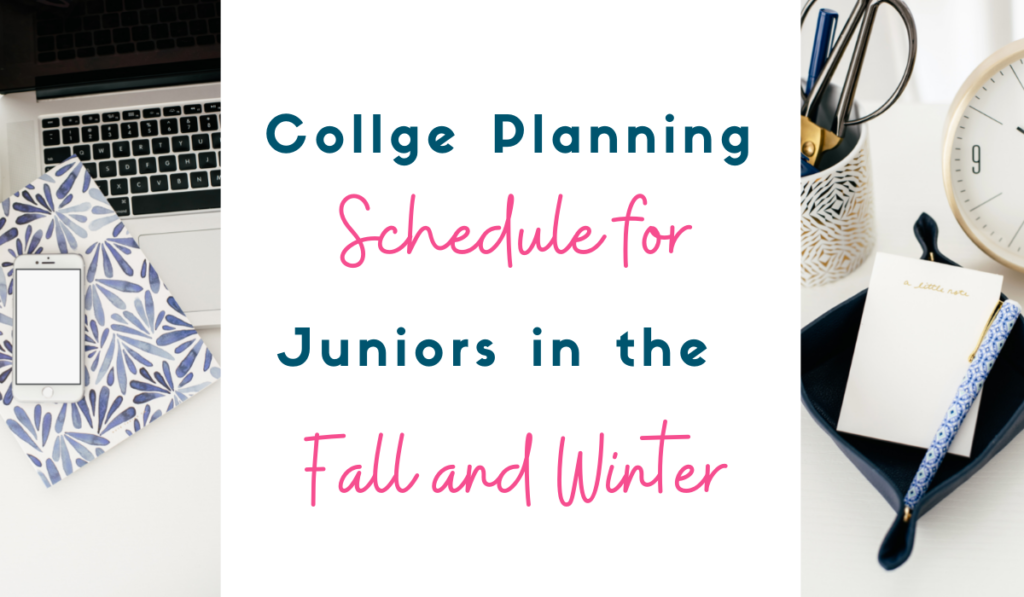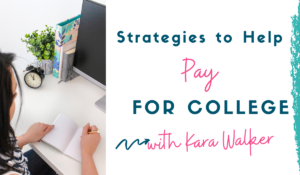0:00:01.4 S1: The college planning schedule for the fall and winner of a student’s junior year is a major stepping stone for both you and your students, our students are continuing to focus on doing the best that they can in their course work, they are reviewing the criteria that make up their perspective college list and maybe even finalizing some pieces on that list, you’re preparing for national testing that you are staying involved with different extracurricular activities, it’s such a busy time, and all of that is before you look at any kind of family time and students wanting to have social time with their friends, so as we look at these different steps in the fall and winner of a student’s junior year, we want to make sure that you are ready to go into the spring and summer before senior year to help you be fully prepared and have your plan. So this is our final episode in the series on looking at how to plan for college, and we will be finishing up the junior year, if you have not listened to any of those other episodes, we have one for each year, we also have some different questions for you to navigate your college visit, but stay tuned.
0:01:25.3 S1: Alright, so what I want to start with is just to remind you that our new Facebook group is open, we would absolutely love to have you join us for some free training, ask questions about your college search, this is just going to be a positive community with other families that are just like you. If you go to facebook dot com groups, confused, a college ready, you can even put in some of your biggest questions, and we will even potentially answer this on the podcast. The other thing that I would love to have you do is if you have found this podcast to be helpful for you, please share it with others, let them know how you have… What you have found beneficial and if you also would leave a review it, and to be able to let others know, we would greatly appreciate that if you share the review on social media and tag me at confused to ready on Instagram, then you will also be entered in a drawing for a free 15-minute coaching call, so sharing that will help others find us and it’s going to give… We’ll give you the opportunity to ask some of those questions.
0:02:37.1 S1: So we are looking at the college planning schedule for our juniors in the fall of their senior year, so one of the things that we want to make sure that our students are doing is that they are continuing to give their absolute best effort in all of their classes, you have had meetings with counselors, you have discussed what your rigor is going to look like, you are maintaining your good grades because you know that GPA makes a huge difference as far as college admissions as well as potential merit scholarships. And so you want to make sure that the colleges are seen, that your junior year that you started off strong, that junior year is the very first thing that colleges are going to see chronologically when they are looking at your transcript, so you’ll have junior year at the top then sophomore year, freshman year. And then towards the bottom might be any classes that you have taken even into middle school, so your grades are going to be so important. Another thing that our juniors are able to do is you can register to take the PSAT in Ms. QT in October. So that test in October year, junior year, is actually what qualified students for the National Merit Scholarship Program, so in senior year, students will find out if their test score qualified them to be semi-finalists and even into the finalist neighborhood with your scores for the National Merit Scholarship program based on that PSAT score.
0:04:09.1 S1: So the other thing that you can do with PSAT that is fabulous, is you can look at those scores and see what you need to do to raise your scores for the next time.
0:04:18.5 S1: This is a really good indicator as far as knowing what you might want to study or focus on when you go to take the SAT as well, so I would strongly encourage students to take that PSAT, to do your best with it, because that can help in the long run as far as planning for the SAT or the ACT.
0:04:45.2 S1: The other thing that we want to look at, the next thing that we want to look at is creating the list of what you’re looking for in a college you want to consider size, location, potential preferred major or careers that you think you might be interested in, this does not have to be defined, and if you go back and listen to some of our previous episodes, we have information about choosing careers, looking for colleges there… It’s actually a three-part. It was our second. Fifth and Seventh episodes, I believe that you could go back, we’ll link these in the show notes, but you actually are able to go in and listen in more detail about creating that college list, so you want to think about are there any clubs or activities that are.
0:05:28.4 S1: Absolutely I have to have these… Are there any other major critical factors that you would consider…
0:05:34.2 S1: The fourth thing that you want to do is look into any different kinds of college or career fairs, check out college websites to use in creating that list of colleges, this might even include something that you want to explore in more detail, that you want to have conversations with their admissions office, or you want to go on a tour. All of those things are also fabulous ways of showing demonstrated interest, once you’ve narrowed down what you’re looking for in those colleges, then you also can go further into researching the colleges and see, Okay, does this really fit my criteria? I would strongly encourage students to look at that college list and create a comparison spreadsheet that lists what you want in the college to see, and then… So you’re going to have your rows in your columns with the names of the colleges, and then do those colleges meet what you want, so that you can weigh is this… This is something that is not something that I absolutely must have. It’s not one of those must-haves in the school, it’s something that would be nice, versus this is something that I absolutely want to have, this college doesn’t have it, so they’re off the list, or this is something that I really don’t want anything to do with.
0:06:53.3 S1: And so I am going to make sure that if a college has that, that will also be off of the list, you want to make sure that you are developing and nurturing your relationship with your school counselor, attend a graduation plan meeting. If you have those in your state, if not, you can even reach out to your counselor and say, Hey, I just wanted to talk to you, I live in South Carolina. Every student has an individual graduation plan, meeting with their specific school counselor, you can ask questions about your school, you can ask questions about your state, you can talk about the rigor of the classes that you plan to take in your senior year, and during that finishing out your high school experience strongly. The other, the last piece for the fall that we want to look at is exploring your study options for the ACT and SAT, this might be individualized time with a tutor, it might be a course that’s led by a set instructor. It could be something where you go in and you’re watching videos, self-led courses, group group learning opportunities or even independent study, some of that is really going to depend on you as a student and what works best for your learning style…
0:08:07.8 S1: For your students learning style as well as the budget, there are free resources that are available when students log in to their college board account, they actually can sink it to Khan Academy, that’s Khan Academy. And that is something that you would be able to sink your college board account where you’re looking at your test scores to your account with Khan Academy to know exactly what you can study to raise your scores for the next time that you take the test. So that’s what students need to do in the fall, as far as winter time, if a student has not already taken the ACT or SAT, you should consider signing up for one of those tests on a national test date. We do recommend that students wait until they’ve at least had that algebra 2 before they jump in and take one of those tests because of a lot of the math content that’s covered in Algebra 2 will be covered on the tests. You also should find out if your state or district is going to offer any kind of free opportunity to test on a school day as well, continue that studying for the ACT and SAT, continue to look at colleges.
0:09:15.7 S1: Go on some visits, if you haven’t already, one of the other things that I talked about several episodes ago was making the most of your college visits and looking into some questions to ask when you go on those college visits, some of our students… Some of your students might be looking at and listening in the military, and another opportunity for them might be to research the As VEB career assessment and talk with the recruiters, see if that is a test that they would be able to take. And then the final thing for the winner would be looking for potential financial aid or scholarship resources, and you can look ahead to say, Okay, what kind of deadlines are we looking at in the summer before my senior year, in the fall of my senior year in the winter of my senior year to kinda look ahead to see what you might be able to apply to to put together a game plan, so don’t forget to… You can check out our episode for junior year and the spring and summer of junior year. I will link that in the show notes. And again, thank you for listening, don’t forget about our Facebook group, it is confused to college ready is the name of the group.
0:10:27.6 S1: And also, we would love if you would leave us a review, we appreciate you all listening and all of your support, and this is, like I said, this is our final episode in this series, so we are excited to move on to some additional topics and hope you all have a wonderful day.









